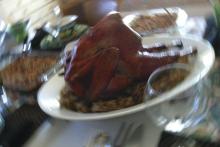For many, the holiday season is a time to celebrate, relax, and enjoy the company of family. Much of this celebrating centers on eating and food. Historically, eating disorders were associated with young, straight, cisgender, white females. Data collected over the past 15 years suggest that eating disorders can affect youth of all ethnicities and genders.
Studies suggest that many adolescents engage in disordered eating behaviors. A national study in 2000 of high school students found that 25% of girls and 11% of boys reported disordered eating and weight control symptoms severe enough to warrant clinical evaluation.1 Studies indicate that anorexia nervosa affects 0.3%-1% of adolescents, and bulimia nervosa affects approximately 0.9%-3% of adolescents.2,3,4 Data in sexual and gender minority youth are sparse but suggest that these youth may be at increased risk of disordered eating behaviors. A 2015 study of 289,000 U.S. college students reported an approximately four times increased risk of eating disorder diagnosis and an approximately 2 times increased risk of disordered eating behaviors (diet pill use, vomiting, or laxative use).5 Two national studies of LGB-identified youth demonstrated higher rates of binge eating, purging, and diet pill use, compared with their heterosexual identified peers.6,7Below are some tips from the National Eating Disorder Association that may be helpful for youth struggling with an eating disorder over the holiday season:
• Eat regularly and in a consistent pattern. Avoid skipping meals or restricting intake in preparation for a holiday meal.
• Discuss any anticipated struggles around food or family with your parents, therapist, health care provider, dietitian, or other members of your support group. This can allow you to plan ahead for any challenges that may arise, and could prevent potential negative or harmful coping behaviors
• Think of someone to call if you are struggling with negative behaviors, thoughts, or emotions. Alert them ahead of time so they are aware of the possibility of you needing them for support.• Consider choosing a loved one to be your “reality check” with food, to either help fix a plate for you or to give you sound feedback on the food portion sizes you make for yourself.
• Have a game plan before you go to a holiday event. Know who your support people are and how you’ll recognize when it may be time to make a quick exit and get connected with needed support.
• Avoid overextending yourself. A lower stress level can decrease the need to turn to eating-disordered behaviors or other unhelpful coping strategies.
• Work on being flexible in your thoughts. Learn to be flexible when setting guidelines for yourself and expectations of yourself and others. Strive to be flexible in what you can eat during the holidays. Take a holiday from self-imposed criticism, rigidity, and perfectionism.
Dr. Chelvakumar is an attending physician in the division of adolescent medicine at Nationwide Children’s Hospital and an assistant professor of clinical pediatrics at the Ohio State University, both in Columbus. She said she had no relevant financial disclosures. Email her at pdnews@frontlinemedcom.com.
Resources
National Eating Disorders Association: www.nationaleatingdisorders.org
“Body image and eating disorders among lesbian, gay, bisexual, and transgender youth” (Pediatr Clin North Am. 2016 Dec;63[6]:1079-90.
References
1. Prev Chronic Dis. 2008 Oct;5(4):A114.
2. Arch Gen Psychiatry. 2011 Jul;68(7):714-23.
3. Pediatr Clin North Am. 2016 Dec;63(6):1079-90.
4. Curr Psychiatry Rep. 2012 Aug;14(4):391-7.
5. J Adolesc Health. 2015 Aug;57(2):144-9.



